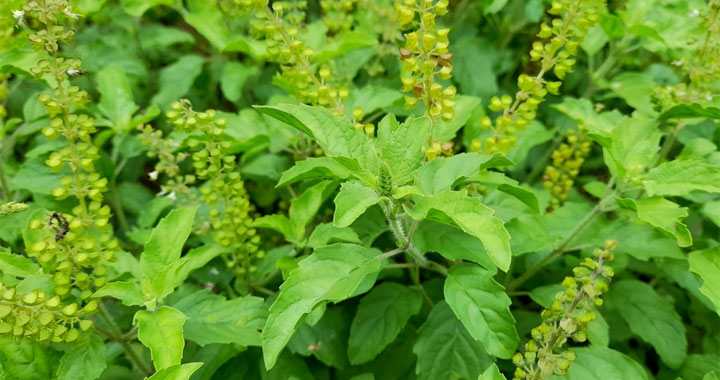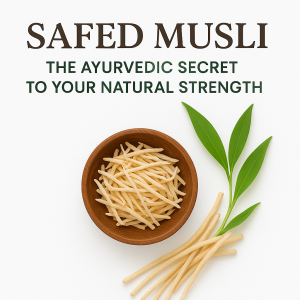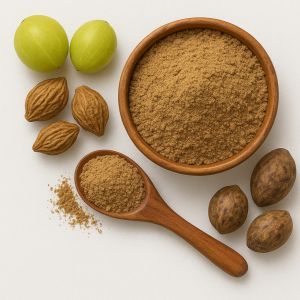
- houseofhealthadmin
“Potential benefits of Tulsi include better immunity, reduces stress and anxiety, improves respiratory health, supports cardiovascular and offers anti-Inflammatory benefits.”
Tulsi, also known as Holy Basil or Tulasi, the scientific name is “Ocimum tenuiflorum”. Is a sacred herb in Hinduism and an essential component of Ayurvedic medicine. This aromatic plant is revered for its numerous health benefits and spiritual significance. Tulsi, known for its wide array of health benefits of its anti-inflammatory, antitussive and anti-allergic properties. It has been used for centuries in India to promote overall wellness and balance in the body.
Health Benefits of Tulsi
- Boosts Immunity: Tulsi are great antioxidants and essential oils that boosts the immune system. Studies have shown that regular consumption of Tulsi can improve the body’s ability to ward off infections, making it a key herb for maintaining long-term health.
- Reduces Stress and Anxiety: Tulsi’s adaptogenic properties help release stress. By balancing cortisol levels, Tulsi reduces stress and anxiety while promoting relaxation and mental clarity. It is often consumed in the form of tea or supplements to alleviate symptoms of anxiety and support emotional well-being.
- Improves Respiratory Health: Tulsi is highly effective in treating respiratory issues such as asthma, bronchitis, and cold symptoms. Its anti-inflammatory properties help reduce congestion and ease breathing. Tulsi is often used in herbal teas or inhaled through steam to relieve respiratory distress.
- Heart Health: Studies indicate that Tulsi is known to support liver function and helps to regulate cholesterol levels and lower blood pressure, contributing to improved cardiovascular health. Regular consumption of Tulsi helps reduce harmful cholesterol while increasing good cholesterol, ultimately promoting heart function and reducing the risk of heart disease.
- Antimicrobial and Antifungal Properties: Tulsi possesses potent antimicrobial and antifungal properties, making it effective in treating skin infections, wounds, and other bacterial or fungal-related conditions. Topical application of Tulsi leaves or oil can help accelerate healing and prevent infection.
- Anti-Inflammatory and Pain Relief: Tulsi’s anti-inflammatory properties make it effective for reducing inflammation and pain associated with conditions like arthritis or joint pain. Regular consumption or topical application of Tulsi alleviates discomfort and promotes joint flexibility.
- Blood Sugar Regulation: Research suggests that Tulsi helps in managing blood sugar levels, making it beneficial for individuals with type 2 diabetes. It helps in balancing insulin levels and reducing glucose levels in the blood.
Side Effects of Tulsi
While Tulsi is generally considered safe for most people, there are a few side effects to be mindful of:
- Blood Thinning: Tulsi may lead to blood-thinning, so individuals taking blood-thinning medications should consult their doctor before consuming it regularly.
- Lowers Blood Sugar: People with diabetes or those on blood sugar medications should monitor their glucose levels closely when using Tulsi as it can further lower blood sugar.
- Pregnancy: Pregnant women should avoid consuming Tulsi in large quantities, as it may stimulate uterine contractions or affect hormone levels.
- Allergic Reactions: In rare cases, some individuals may experience allergic reactions such as itching, swelling, or shortness of breath. If any of these symptoms occur, it’s important to discontinue use immediately.
Common Uses of Tulsi
- Tulsi Tea: One of the most common ways to consume Tulsi is by brewing its leaves into a soothing tea. Tulsi tea helps in reducing stress, improving digestion, and boosting immunity.
- Supplements: Available Tulsi capsule or tablet form for those looking to incorporate it into their daily routine in a more concentrated manner. Supplements are typically used for stress reduction, blood sugar management, or as a general immune booster.
- Essential Oils: Tulsi essential oil is widely used for its aromatic properties and as a topical treatment for skin issues. It’s also commonly used in aromatherapy for relaxation and stress relief.
- Topical Application: The leaves of Tulsi can be ground into a paste and applied directly to the skin to treat wounds, infections, or acne. Its antimicrobial properties help cleanse and heal the skin effectively.
- Inhalation: Tulsi can also be used in steam inhalation to relieve respiratory conditions such as colds, flu, and sinusitis. This method clears nasal passages and eases breathing.
Conclusion
Its ability to boost immunity, reduce stress, and improve heart and respiratory health make it a staple in natural wellness routines. However, it’s important to be aware of potential side effects and consult a healthcare provider, especially if you have pre-existing conditions or are taking medication. Whether consumed as tea, supplements, or applied topically, Tulsi is a versatile and beneficial herb that supports overall well-being.







